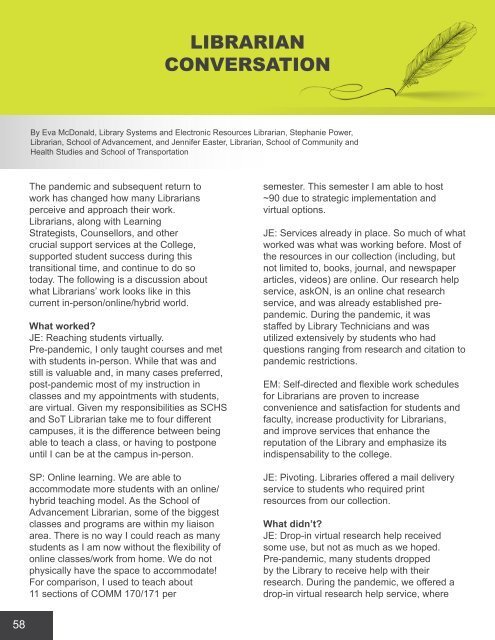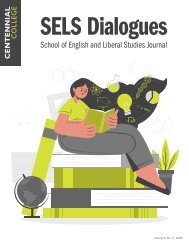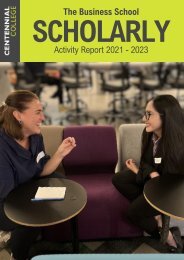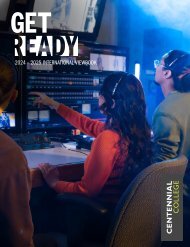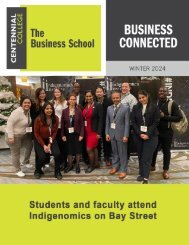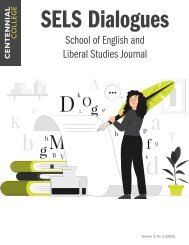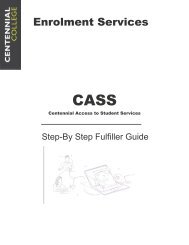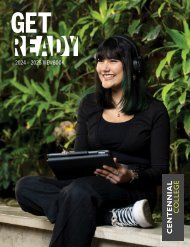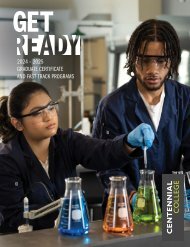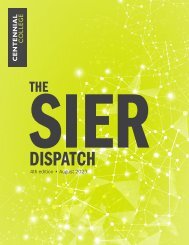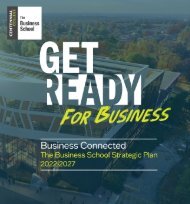The Teaching and Learning Innovation Digest - May 2023
Welcome to a truly special edition of the Teaching and Learning Innovation Digest! Our seventh annual academic publication has assumed an incredibly meaningful shape and form for a number of reasons. Not only did we receive an enthusiastic response with over 30 submissions via our institutional broadcast, but we also have consciously and intentionally embraced the principles of Universal Design for Learning by attempting to represent and celebrate the varied forms of expressions therein. From reflective essays, poetry, visual and performing arts, podcasts, video conversations to scholarly work, academic and applied research, news and updates, and interviews, this is truly a power-packed publication!
Welcome to a truly special edition of the Teaching and Learning Innovation Digest! Our seventh annual academic publication has assumed an incredibly meaningful shape and form for a number of reasons. Not only did we receive an enthusiastic response with over 30 submissions via our institutional broadcast, but we also have consciously and intentionally embraced the principles of Universal Design for Learning by attempting to represent and celebrate the varied forms of expressions therein. From reflective essays, poetry, visual and performing arts, podcasts, video conversations to scholarly work, academic and applied research, news and updates, and interviews, this is truly a power-packed publication!
Create successful ePaper yourself
Turn your PDF publications into a flip-book with our unique Google optimized e-Paper software.
<strong>The</strong> p<strong>and</strong>emic <strong>and</strong> subsequent return to<br />
work has changed how many Librarians<br />
perceive <strong>and</strong> approach their work.<br />
Librarians, along with <strong>Learning</strong><br />
Strategists, Counsellors, <strong>and</strong> other<br />
crucial support services at the College,<br />
supported student success during this<br />
transitional time, <strong>and</strong> continue to do so<br />
today. <strong>The</strong> following is a discussion about<br />
what Librarians’ work looks like in this<br />
current in-person/online/hybrid world.<br />
What worked?<br />
JE: Reaching students virtually.<br />
Pre-p<strong>and</strong>emic, I only taught courses <strong>and</strong> met<br />
with students in-person. While that was <strong>and</strong><br />
still is valuable <strong>and</strong>, in many cases preferred,<br />
post-p<strong>and</strong>emic most of my instruction in<br />
classes <strong>and</strong> my appointments with students,<br />
are virtual. Given my responsibilities as SCHS<br />
<strong>and</strong> SoT Librarian take me to four different<br />
campuses, it is the difference between being<br />
able to teach a class, or having to postpone<br />
until I can be at the campus in-person.<br />
SP: Online learning. We are able to<br />
accommodate more students with an online/<br />
hybrid teaching model. As the School of<br />
Advancement Librarian, some of the biggest<br />
classes <strong>and</strong> programs are within my liaison<br />
area. <strong>The</strong>re is no way I could reach as many<br />
students as I am now without the flexibility of<br />
online classes/work from home. We do not<br />
physically have the space to accommodate!<br />
For comparison, I used to teach about<br />
11 sections of COMM 170/171 per<br />
LIBRARIAN<br />
CONVERSATION<br />
By Eva McDonald, Library Systems <strong>and</strong> Electronic Resources Librarian, Stephanie Power,<br />
Librarian, School of Advancement, <strong>and</strong> Jennifer Easter, Librarian, School of Community <strong>and</strong><br />
Health Studies <strong>and</strong> School of Transportation<br />
semester. This semester I am able to host<br />
~90 due to strategic implementation <strong>and</strong><br />
virtual options.<br />
JE: Services already in place. So much of what<br />
worked was what was working before. Most of<br />
the resources in our collection (including, but<br />
not limited to, books, journal, <strong>and</strong> newspaper<br />
articles, videos) are online. Our research help<br />
service, askON, is an online chat research<br />
service, <strong>and</strong> was already established prep<strong>and</strong>emic.<br />
During the p<strong>and</strong>emic, it was<br />
staffed by Library Technicians <strong>and</strong> was<br />
utilized extensively by students who had<br />
questions ranging from research <strong>and</strong> citation to<br />
p<strong>and</strong>emic restrictions.<br />
EM: Self-directed <strong>and</strong> flexible work schedules<br />
for Librarians are proven to increase<br />
convenience <strong>and</strong> satisfaction for students <strong>and</strong><br />
faculty, increase productivity for Librarians,<br />
<strong>and</strong> improve services that enhance the<br />
reputation of the Library <strong>and</strong> emphasize its<br />
indispensability to the college.<br />
JE: Pivoting. Libraries offered a mail delivery<br />
service to students who required print<br />
resources from our collection.<br />
What didn’t?<br />
JE: Drop-in virtual research help received<br />
some use, but not as much as we hoped.<br />
Pre-p<strong>and</strong>emic, many students dropped<br />
by the Library to receive help with their<br />
research. During the p<strong>and</strong>emic, we offered a<br />
drop-in virtual research help service, where<br />
students could drop-in <strong>and</strong> receive one-on-one<br />
help from a Librarian on Teams. While some<br />
students utilized it, unlike in-person, where<br />
students will stop by the Library for help at their<br />
convenience, it appeared that many students<br />
were not interested in dropping in for virtual<br />
research help.<br />
What did we learn? Did we keep it, change<br />
it, reimagine it?<br />
JE: Some Librarians who had not taught<br />
online previously had to learn to teach online!<br />
Fortunately, so many of the tools used in-class<br />
(such as Mentimeter) transferred seamlessly to<br />
the online world. <strong>The</strong> p<strong>and</strong>emic has introduced<br />
the opportunity to teach on dem<strong>and</strong><br />
—whether that be recording a live lecture,<br />
so students can rewatch later, or create an<br />
interactive video presentation on research<br />
that students can watch at a time of<br />
their convenience.<br />
EM: In addition to this increased workload,<br />
a new generation of students have become<br />
accustomed to remote learning <strong>and</strong><br />
expect round-the-clock support for their<br />
studies. No longer are research questions<br />
confined to 9am to 5pm working hours, <strong>and</strong><br />
services that were formerly offered exclusively<br />
in person, such as one-on-one research<br />
sessions with a Librarian, are now expected<br />
to be available daily, from early morning to<br />
late evening, in order to accommodate early<br />
risers, night owls, working students, students<br />
with young children, <strong>and</strong> even long-distance<br />
<strong>and</strong> overseas students working in different<br />
time zones.<br />
SP: I think we learned that both students<br />
<strong>and</strong> faculty, which includes librarians,<br />
appreciate the flexibility of hybrid work/learning<br />
opportunities. I am always surprised by the<br />
number of students that ask for a recording of<br />
a workshop, but I am very grateful that it’s an<br />
option we are able to provide. We also learned<br />
the value of professional development. As we<br />
shifted to more online instruction <strong>and</strong> research<br />
help, having the chance to flex our pedagogical<br />
muscles to ensure that students are feeling<br />
connected <strong>and</strong> engaged was very rewarding.<br />
Where do we go from here, what next!?<br />
EM: Librarians’ focusing on new skills<br />
development. Many of these critical skills<br />
are needed by the Library right now, but few<br />
Librarians possess competence in areas such<br />
as copyright <strong>and</strong> transactional licensing, data<br />
<strong>and</strong> analytics, makerspace <strong>and</strong> emerging<br />
technologies, coding, UX <strong>and</strong> universal design<br />
for learning, <strong>and</strong> more.<br />
SP: I would love to develop more robust<br />
information literacy programming.<br />
58<br />
59


